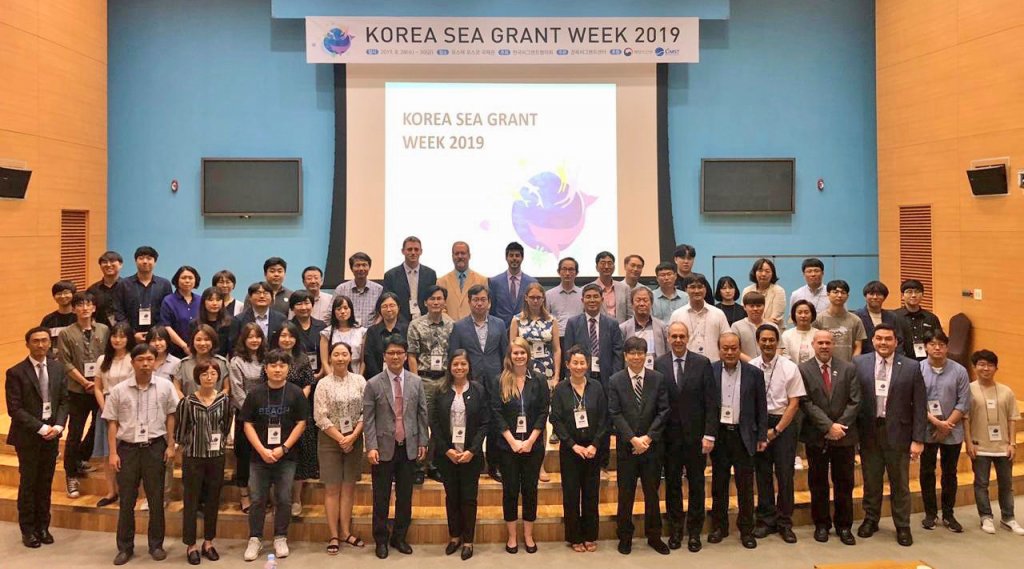
Korea Sea Grant Week 2019
In August, Hawaiʻi Sea Grant, along with members from California Sea Grant, Guam Sea Grant and Oregon Sea Grant, participated in Korea Sea Grant Week 2019 at the Pohang University of Science and Technology (POSTECH) in Pohang, South Korea.
The Korea Sea Grant program was developed in 2000 with help from Sea Grant International. Like Sea Grant programs in the U.S., the Korea Sea Grant program fosters marine and coastal research, outreach, and education to maintain a healthy coastal environment and economy.
In the spirit of sharing information to address management issues at global and regional scales, U.S. Sea Grant participants were asked to present to Korea Sea Grant members on various topics. Coastal resilience specialist Katy Hintzen and outreach specialist Michael Mezzacapo presented on behalf of Hawaiʻi Sea Grant highlighting sea level rise issues and Hawaiʻi’s cesspool conversion efforts.
Hintzen’s presentation focused on Hawai’i Sea Grant’s efforts to address sea-level rise through the integration of community-based knowledge and cutting-edge scientific research. Her presentation also included information on the Hawaiian Islands Sentinel Site Cooperative and the Hawai’i and Pacific Islands King Tides Project. Mezzacapo spoke on the impact of outdated waste disposal systems, such as cesspools, which pollute groundwater and ocean ecosystems. Additional information about Sea Grant efforts assisting state and regional stakeholders to address onsite wastewater system replacement was also discussed.
Members of Jeju Sea Grant (Jeju is an island in South Korea located in the Korean Strait) expressed similar wastewater challenges with nutrient pollution from septic systems. The hope is for Jeju Sea Grant and Hawaiʻi Sea Grant to share information about common challenges, strategies, and outreach efforts.
Dr. Darren Lerner, director of Hawai‘i Sea Grant, gave the keynote presentation on behalf of the U.S. delegation, discussing Sea Grant’s economic benefits, partnerships, and educational opportunities. Dr. Lerner also highlighted the roles of the Sea Grant Association and National Sea Grant Advisory Board, and the overarching principles of the Sea Grant organization which serve to guide and inform its activities and engagement with stakeholders and community.
In addition to Hawai‘i Sea Grant, director Dr. Shuana Oh and extension agent Dr. Luke Gardner presented on behalf of California Sea Grant, discussing local aquaculture challenges and methods to integrate research, outreach, and training at California Sea Grant. Dr. Austin Shelton, director of Guam Sea Grant, and Fran Castro, program leader/research associate, presented on their efforts to improve island sustainability through the Sea Grant model. And finally, Dr. Dave Hansen, program leader at Oregon Sea Grant, presented on integrating research and outreach in Oregon.
U.S. delegates were warmly welcomed and enjoyed presentations by each of the Korea Sea Grant directors regarding prominent research projects from each program. Additionally, the conference offered several networking opportunities to promote collaboration. Though U.S. and Korean programs are physically separated by an ocean, they share the common position that an international Sea Grant network provides a platform to promote research, educational activities, technology transfer, and are a way to bridge cultural differences, all in an effort to improve the understanding of our shared marine and coastal resources.
Hawaiʻi Sea Grant Events

